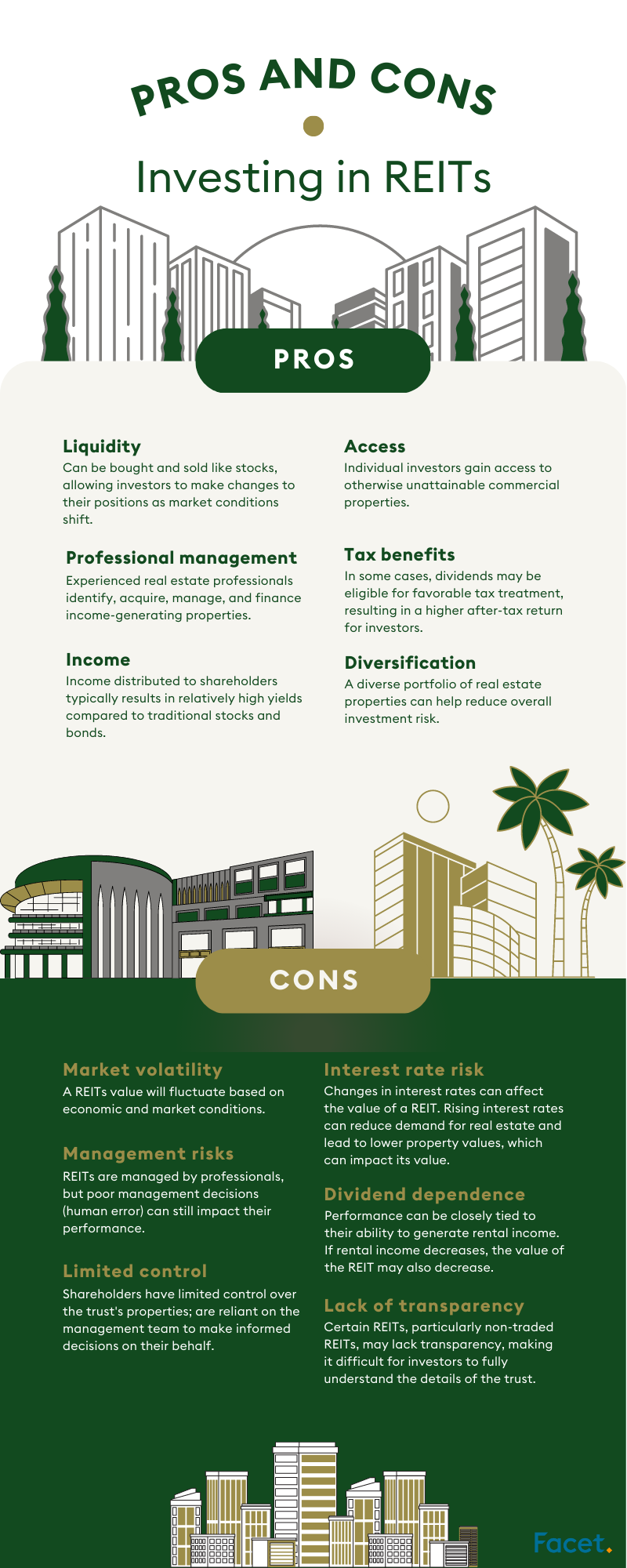
The information provided is based on the published date.
Key takeaways
- Real Estate Investment Trusts (REITs) are a type of company that own, operate, or finance income-generating real estate properties
- Different types of REITs include Equity REITs, Mortgage REITs, and Hybrid REITs
- Investing in a REIT can provide benefits such as diversification, income generation, and access to commercial real estate
- Risks of investing in a REIT include market volatility, interest rate risk, dividend dependence, regulatory risks, management risks, limited control over the trust's properties and management, and lack of transparency
- Research available options and seek professional advice before making any investment decisions
What is a Real Estate Investment Trust (REIT)?
REITs (Real Estate Investment Trusts) are companies that own, operate, or finance income-producing real estate properties such as apartment buildings, office buildings, hotels, shopping centers, and more.
They allow individual investors to invest in real estate properties and enjoy the benefits of ownership without actually buying, managing, and maintaining the properties themselves.
Before investing in a REIT, it's important to know how they work, the different types, and their advantages and disadvantages.
How do REITs work?
Structure
REITs are structured as a trust, which means they are legally required to distribute a substantial portion of their income to shareholders as dividends.
Investment
Investors can purchase shares in a REIT—either publicly-traded or non-traded—just like they would with stocks or mutual funds. This provides investors with exposure to a diversified portfolio of real estate properties.
Public vs. private REITs
- Public REITs are companies that are publicly traded on stock exchanges, and anyone can invest in them by buying shares. They are registered with the Securities and Exchange Commission (SEC) and must comply with strict reporting and disclosure requirements.
- Private REITs are not publicly traded and are only available to a limited group of investors. They are not required to register with the SEC or comply with the same disclosure and reporting requirements as publicly-traded REITs. Private REITs are typically offered through private placement offerings and are often only available to accredited investors – individuals with a high net worth or institutional investors like pension funds or endowments.
Properties
REITs use the money raised from investors to acquire, manage, and operate real estate properties. They generate income from the rental of these properties and may also generate income from property sales.
Dividends
Must pay at least 90% of its taxable income out to shareholders. This results in relatively high yields compared to traditional stocks and bonds.
Regulation
The Securities and Exchange Commission (SEC) regulates REITs. They are required to adhere to strict accounting and disclosure rules. This helps ensure that REITs operate transparently and in the best interest of their shareholders.
What are the different types of REITs?
While there are many types of REITs, they typically fall into three categories:
- Equity REITs: invest in physical properties and collect rent from tenants.
- Mortgage REITs: invest in short-term mortgage loans or mortgage-backed securities (MBS).
- Hybrid REITs: combine aspects of the previous two, investing in physical properties and mortgages.
Whichever type you choose, it's important to do your research and understand all the potential risks before investing.

What are the pros of investing in a REIT?
Here are some of the main advantages of investing in a REIT.
- Diversification: Investors are exposed to a diverse portfolio of real estate properties, which can help reduce overall investment risk.
- Liquidity: Can be bought and sold like stocks, allowing investors to make changes to their positions as market conditions shift.
- Cost-effective: Eliminates the need to buy, manage, and maintain individual properties.
- Access to commercial properties: Provide individual investors with access to commercial properties, such as office buildings, shopping centers, and hotels, which may be difficult (and too expensive) to buy and manage on their own.
- Tax benefits: In some cases, dividends may be eligible for favorable tax treatment, resulting in a higher after-tax return for investors.
Of course, like all investments, investing in a REIT also carries certain risks, so it's important to thoroughly research and understand them before investing.
What are the cons of investing in a real estate investment trust?
Here are some of the main disadvantages of investing in a REIT.
- Market volatility: Value can fluctuate based on economic and market conditions.
- Interest rate risk: Changes in interest rates can affect the value of a REIT. Rising interest rates can reduce demand for real estate and lead to lower property values, which can impact its value.
- Dividend dependence: Performance can be closely tied to their ability to generate rental income. If rental income decreases, the value of the REIT may also decrease.
- Regulatory risks: REITs are subject to a variety of regulations, and changes in regulations can impact their ability to operate and generate income.
- Management risks: REITs are managed by professional real estate managers, but poor management decisions (human error) can still impact their performance.
- Limited control: Shareholders have limited control over the trust's properties and management; are reliant on the management team to make informed decisions on their behalf.
- Lack of transparency: Some REITs, particularly non-traded REITs, may lack transparency, making it difficult for investors to fully understand the properties, financial performance, and management of the trust.
How do I invest in a REIT?
REITs are accessible to a wide range of investors, regardless of their financial status. For those who prefer a hands-off approach, retail investors often leave it up to the professionals to invest in mutual funds or exchange-traded funds (REIT ETFs). On the other hand, some investors may prefer to take a more active role by investing directly in publicly-traded individual REIT stocks.
If you decide to go it alone, get ready to do some research.
To start analyzing a REIT, it's necessary to collect some information. This data can be obtained from the company's website in the investor relations section or by browsing through SEC filings. Several essential details worth examining include:
- Investor Presentation
- Quarterly supplemental report
- Portfolio details
- 10-K (Annual report filed with the SEC)
- 10-Q (Quarterly report filed with the SEC)
- Press releases
Once you’ve finished your research, follow these steps:
- Decide on a type of REIT: As mentioned earlier, there are different types of REITs, including Equity REITs, Mortgage REITs, and Hybrid REITs. Consider which type of REIT aligns with your investment goals and risk tolerance.
- Choose a REIT: Once you've narrowed down your options, choose a REIT that meets your investment criteria.
- Purchase shares: To purchase shares of a publicly traded REIT, open a brokerage account and place an order to buy shares of the REIT. For non-traded REITs, contact the REIT or your financial advisor to make the purchase.
- Monitor your investment: Keep track of your investment and stay up-to-date on the REIT's performance and any changes in the real estate market that may affect the trust. Consider diversifying your portfolio by investing in multiple REITs or other types of investments.
Final word
Investing in a REIT requires a great deal of research and analysis. While it can provide potential benefits such as income and diversification, it also carries certain risks that investors should be aware of before investing.
One of the most significant risks is market volatility, which can greatly affect the value of a REIT's assets and lead to investment losses. Moreover, there are management risks that come with investing in a REIT, such as inexperienced or ineffective management teams that may not be able to make sound investment decisions.
Therefore, it's important for investors to carefully consider these risks before making any investment decisions. It's recommended that investors seek professional advice from experts who are familiar with the complexities of REITs.
Prefer a helping hand? We’re here to guide you.



